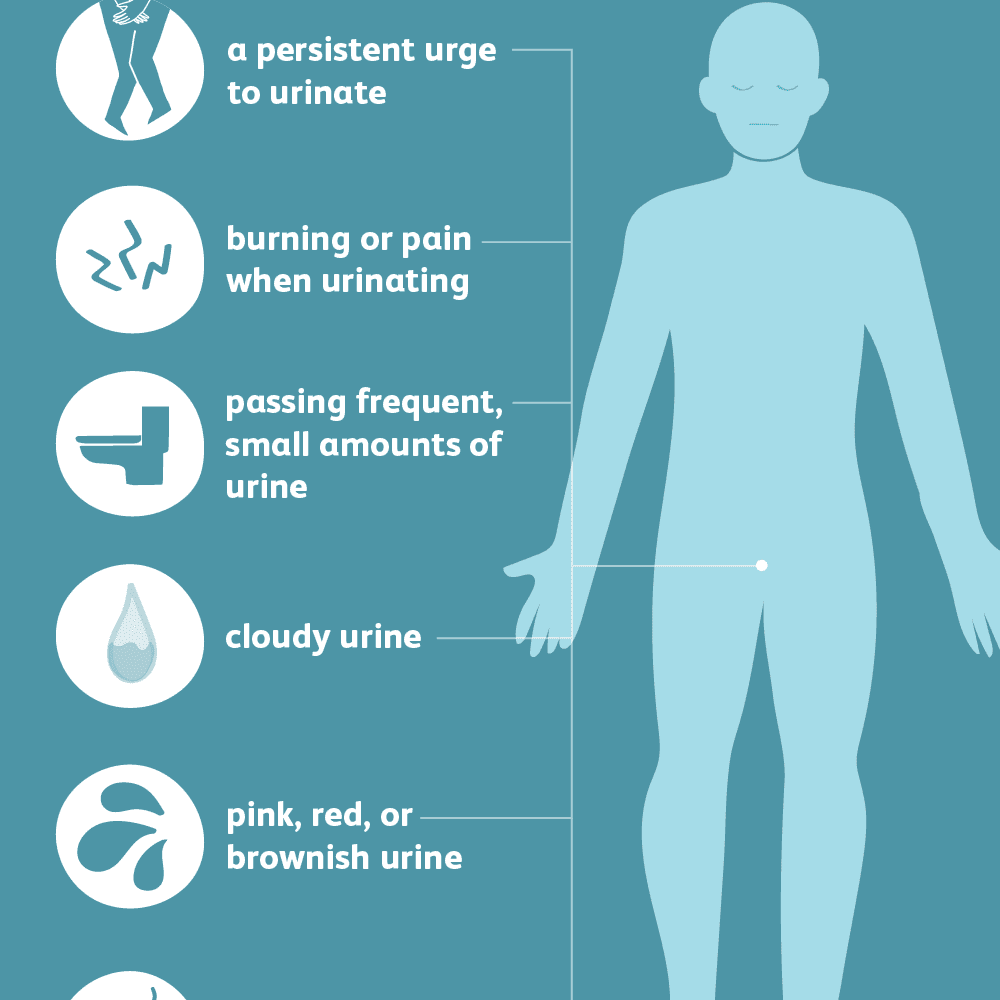Are Urinary Tract Infections Contagious
No. Urinary tract infections are not contagious.
- Lower abdominal pain or pelvic pressure or pain
- Mild fever , chills, and “just not feeling well”
- Urethra : Burning with urination
Upper urinary tract infection
Symptoms develop rapidly and may or may not include the symptoms of a lower urinary tract infection.
- Fairly high fever
- Shaking chills
- Vomiting
- Flank pain: pain in the back or side, usually on only one side at about waist level
In newborns, infants, children, and elderly people, the classic symptoms of a urinary tract infection may not be present. Other symptoms may indicate a urinary tract infection.
- Newborns: fever or hypothermia , poor feeding, jaundice
- Infants: vomiting, diarrhea, fever, poor feeding, not thriving
- Children: irritability, eating poorly, unexplained fever that doesn’t go away, loss of bowel control, loose bowels, change in urination pattern
- Elderly people: fever or hypothermia, poor appetite, lethargy, change in mental status
Pregnant women are at increased risk for a UTI. Typically, pregnant women do not have unusual or unique symptoms. If a woman is pregnant, her urine should be checked during prenatal visits because an unrecognized infection can cause pregnancy health complications.
Although most people have symptoms of a urinary tract infection, some do not.
How Are Urinary Tract Infections Diagnosed
Your doctor will use the following tests to diagnose a urinary tract infection:
- Urinalysis: This test will examine the urine for red blood cells, white blood cells and bacteria. The number of white and red blood cells found in your urine can actually indicate an infection.
- Urine culture: A urine culture is used to determine the type of bacteria in your urine. This is an important test because it helps determine the appropriate treatment.
If your infection does not respond to treatment or if you keep getting infections over and over again, your doctor may use the following tests to examine your urinary tract for disease or injury:
- Ultrasound: In this test, sound waves create an image of the internal organs. This test is done on top of your skin, is painless and doesnt typically need any preparation.
- Cystoscopy: This test uses a special instrument fitted with a lens and a light source to see inside the bladder from the urethra.
- CT scan: Another imaging test, a CT scan is a type of X-ray that takes cross sections of the body . This test is much more precise than typical X-rays.
Which Infections Are Worse
NIDDK . A kidney infection is usually caused by a bladder or urethra infection where the bacteria multiply and travel upward toward the kidneys.
Kidney infections can be extremely serious and painful, sometimes leading to hospitalization to receive intravenous antibiotics. If left untreated, kidney infections due to UTIs can cause infections in the bloodstream. This can be life-threatening.
Recommended Reading: Can Stress Cause Overactive Bladder
How Common Are Urinary Tract Infections
Urinary tract infections are very common, occurring in 1 out of 5 women sometime in their lifetime. Though UTIs are common in women, they can also happen to men, older adults and children. One to 2% of children develop urinary tract infections. Each year, 8 million to 10 million visits to doctors are for urinary tract infections.
What Kinds Of Doctors Treat Urinary Tract Infections

Most urinary tract infections can be treated by your primary care doctor or your child’s pediatrician. They are usually the best provider to treat you as they are most familiar with your medical history, medications you are taking, and other factors that might affect your treatment. If you seek treatment in an urgent care facility, a specialist in emergency medicine may be involved in your care.
If there are frequent reoccurrences of UTIs or if complicating circumstances are present, your primary care doctor might refer you to a urologist, a physician who specializes in the diagnosis and treatment of conditions related to the urinary system.
Don’t Miss: Overactive Bladder And Back Pain
Recovery And Management Of Urinary Tract Infection In Cats
The recovery period depends on the severity of the UTI and how quickly the cat was treated. If the infection is caught early on, and there are no other developments as a result, a full recovery should be expected within a few days or so of beginning antibiotic therapy. Some cats seem markedly improved after even one dose of antibiotics. However, ALWAYS complete the full course of medications exactly as directed by your veterinarian.
Occasionally, cats will develop frequent, recurrent urinary tract infections. In these cases, a longer course of antibiotics and repeat urine cultures may be necessary.
What Causes A Uti In Children
Bacteria, often the intestinal bacteria E. coli, can easily enter the urinary tract from the skin around the anus. UTIs are more common in girls, especially during potty training, because a girl’s urethra is shorter and closer to the anus. Uncircumcised baby boys also have a slightly elevated risk. Some risk factors for UTI are not preventable, including:
- A structural or functional abnormality in the urinary tract .
- An abnormal backward flow of urine from the bladder up the ureters and toward the kidneys, known as vesicoureteral reflux, which is very common in kids with UTIs.
In some cases, additional tests such as ultrasound or bladder x-rays may be recommended to look for these conditions and to determine the most effective treatment.
Also Check: I Keep Getting Bladder Infections
What Are Causes And Risk Factors For A Urinary Tract Infection
The urine is normally sterile. An infection occurs when bacteria get into the urine and begin to grow. The bacterial infection usually starts at the opening of the urethra where the urine leaves the body and moves upward into the urinary tract.
- The culprit in at least 90% of uncomplicated infections is a type of bacteria called Escherichia coli, better known as E. coli. These bacteria normally live in the bowel and around the anus.
- These bacteria can move from the area around the anus to the opening of the urethra. The two most common causes of this are improper wiping and sexual intercourse.
- Usually, the act of emptying the bladder flushes the bacteria out of the urethra. If there are too many bacteria, urinating may not stop their spread.
- The bacteria can travel up the urethra to the bladder, where they can grow and cause an infection.
- The infection can spread further as the bacteria move up from the bladder via the ureters.
- If they reach the kidney, they can cause a kidney infection , which can become a very serious condition if not treated promptly.
The following people are at increased risk of urinary tract infection:
The following special groups may be at increased risk of urinary tract infection:
Can Both Male And Female Cats Get Urinary Tract Infections
Both male and female cats can get urinary tract infections, but they tend to be more common in females than in males. However, UTIs in male cats can become serious very quickly, so its important to consult your veterinarian immediately if you notice any symptoms, regardless of whether your cat is male or female.
Recommended Reading: Lack Of Bladder Control Uti
Preventing Urinary Tract Infections
Urinary tract infections are most often caused by bacteria spreading from the anal or genital region and entering the urinary tract. Because of this, there are a number of preventative methods that can minimize the risk of experiencing a UTI:
- Regular urination
- Emptying the bladder after sexual intercourse
- Drinking lots of water, ideally at least 1.5 liters a day. Avoid alcohol and caffeine, which can irritate the bladder
- Wiping from front to back after using the toilet to avoid spreading bacteria from the anal region
- Maintaining good personal hygiene and keeping the genital area clean and dry
- Taking showers instead of baths
Upper Urinary Tract Infection Symptoms
In addition to the symptoms above, the presence of the following symptoms may indicate that the affected person is suffering from an upper urinary tract infection:
- Fever
- Pain and/or aches between the upper abdomen and the back, known as flank pain
- Signs of confusion, disorientation and/or agitation may occur, especially in elderly patients
Good to know: Upper urinary tract infection symptoms are similar in both men and women.
If you are experiencing possible symptoms of a urinary tract infection, carry out a symptom assessment with the free Ada app.
You May Like: I Have A Weak Bladder Help
How To Prevent Uti Re
Following some tips can help you avoid getting another UTI:
- Empty your bladder often as soon as you feel the need to pee don’t rush, and be sure you’ve emptied your bladder completely.
- Wipe from front to back after you use the toilet.
- Drink lots of water.
- Choose showers over baths.
- Stay away from feminine hygiene sprays, scented douches, and scented bath products they’ll only increase irritation.
- Cleanse your genital area before sex.
- Pee after sex to flush out any bacteria that may have entered your urethra.
- If you use a diaphragm, unlubricated condoms, or spermicidal jelly for birth control, you may want to switch to another method. Diaphragms can increase bacteria growth, while unlubricated condoms and spermicides can irritate your urinary tract. All can make UTI symptoms more likely.
- Keep your genital area dry by wearing cotton underwear and loose-fitting clothes. Donââ¬â¢t wear tight jeans and nylon underwear they can trap moisture, creating the perfect environment for bacteria growth.
Show Sources
Complications Of Urinary Tract Infections

Urinary tract infections are an extremely common condition, and most people recover quickly with antibiotic treatment. However, if left untreated the infection can spread throughout the urinary tract system, increasing in severity and causing complications.
In some cases, the infection can reach the kidneys in the upper urinary tract, an infection known as pyelonephritis. Without medical intervention, this can lead to permanent kidney damage. Possible complications from untreated UTIs include:
- Formation of abscesses within or around the kidneys
- Swelling of the kidneys, also known as hydronephrosis
- , also known as blood poisoning
All of these complications are serious and require immediate medical attention.
You May Like: Hernia Of The Urinary Bladder
How Are Utis Diagnosed
Only a health care provider can treat urinary tract infections. The first thing a doctor will do is confirm that a person has a UTI by taking a clean-catch urine specimen. At the doctor’s office, you’ll be asked to clean your genital area with disposable wipes and then pee into a sterile cup.
The sample may be used for a urinalysis or a urine culture . Knowing what bacteria are causing the infection can help your doctor choose the best treatment.
When Should People Seek Medical Care For A Uti
Any adult or child who develops any of the symptoms of a urinary tract infection needs to be evaluated by a medical professional, preferably within 24 hours. Most medical offices can test urine for infection by using a quick urine “dipstick” test.
- Someone who has symptoms of a lower urinary tract infection should call a health care professional for an appointment, preferably on the same day that symptoms are recognized.
- Someone who has symptoms of an upper urinary tract infection involving the kidneys should call a health care professional immediately. Depending on the situation, he or she will recommend either a visit to the office or a hospital emergency department.
If someone has symptoms of a lower urinary tract infection and any of the following applies, he or she may be at risk for complications of the urinary tract infection.
- Vomiting and inability to keep down clear fluids or medication
- Not better after taking antibiotics for two days
- Pregnant
- Having diabetes or another disease that affects the immune system
- Taking medication that suppresses the immune system such as cancer chemotherapy
Infants, children, and elderly people with any of the signs and symptoms of UTI should see their health care professional as soon as possible or go to an emergency department for evaluation.
The usual treatment for both simple and complicated urinary tract infections is antibiotics. The type of antibiotic and duration of treatment depends on the circumstances.
Recommended Reading: Foods That Help Overactive Bladder
Other Ways To Prevent Recurring Utis
If you have more than 3 UTIs in 1 year, or 2 UTIs in 6 months, there are other things that may help prevent UTIs.
There is some evidence that women under 65 years old who keep getting UTIs may find it helpful to take:
- a supplement called D-mannose this is not recommended for pregnant women
- cranberry products, such as juice or tablets
Speak to your doctor before taking any of these during pregnancy.
Be aware that D-mannose and cranberry products can contain a lot of sugar.
Page last reviewed: 18 November 2020 Next review due: 18 November 2023
How Do You Get A Bladder Infection Or Uti
UTIs happen when bacteria enters the urethra and spreads. Urinary tract infections are fairly common and can happen to anyone, but the following risk factors can increase your chances of getting one:
- The sex you’re assigned at birthpeople assigned female at birth have shorter urethras than those assigned male at birth, making it easier for bacteria to travel to the bladder and kidneys.
- Hormone changesmenopause, pregnancy, or just that time of the month can increase your risk of infection.
- Diaphragms and spermicidesthese forms of contraception can kill off good bacteria, increasing the bad bacteria which can find its way to the urethra.
- Genetic predispositionThats right! It could just be a genetic thing. Genetics play a role in the shape and size of your urinary tract making some individuals more prone to infections.
- Sexual activityPee as soon as possible after sex to prevent UTIs.
- Hygiene habitsBubble baths and scented feminine products might feel like self-care, but they can cause irritation that leads to UTIs. Also, always make sure youre wiping front to back!
- Chronic illnessIllness that causes changes to your immune system, like diabetes, can make you more prone to UTIs.
- Holding itNo need to be a hero. When you have to go to the bathroom, you should go.
- Not drinking enough waterAdd it to the list of reasons you should drink more water! Staying hydrated can help stave off infections.
Also Check: Best Way To Treat Bladder Infection
How Can Someone Prevent A Urinary Tract Infection
Prevention of urinary tract infections is similar to some of the home remedies mentioned previously.
Asking Do I Have A Uti These Are The Signs
If youre asking do I have a UTI? its probably time to see a doctor. Left untreated, a urinary tract infection can cause serious complications in the kidneys.
Checking for a UTI only requires a simple urine test that you can get right away at urgent care. If youre in the Bossier City area, contact us for an appointment or just walk in. Were here to help!
Also Check: Sulfa Medication For Bladder Infection
How Long Does A Uti Last
Save Money On Absorbent Products! Check Out These Offers From Our Trusted Partners.
If you have a UTI, its best to get it treated right away before any complications develop . Its possible for a UTI to get better on its own, but most of the time, it wont. While home remedies can help ease some of the discomfort, a doctor can prescribe you an antibiotic that is a much quicker and more effective treatment. An antibiotic will start working immediately and, depending on how complicated your UTI is, may clear it up in a matter of days. Be sure to always take your medication how your doctor prescribes.
Urinary Tract Diseases In Cats: Our 2022 Guide

Urinary tract diseases in cats are serious matter and should never be ignored. It is one of the most common reasons cats are surrendered in shelters. Unfortunately, some senior cats with urinary issues end up being euthanized because they are often the ones left unadopted in shelters.
|
Why Buy from Chewy? |
If caught early, urinary tract infection in cats is treatable. There are also many medical and nutritional advances that help resolve this health problem.
Also Check: What Were Your Symptoms Of Bladder Cancer
What Are The Symptoms Of A Uti
One of the most common symptoms of a UTI is a frequent and urgent need to pee. You might feel like you need to pee all the time, even if you just went. Other UTI symptoms include:
-
pain or burning when you pee
-
bad-smelling or cloudy urine
-
blood or pus in your urine
-
soreness, pressure, or cramps in your lower belly, back, or sides
If the infection goes to your kidneys, your UTI symptoms may also include:
-
pain in your mid-back
-
fever